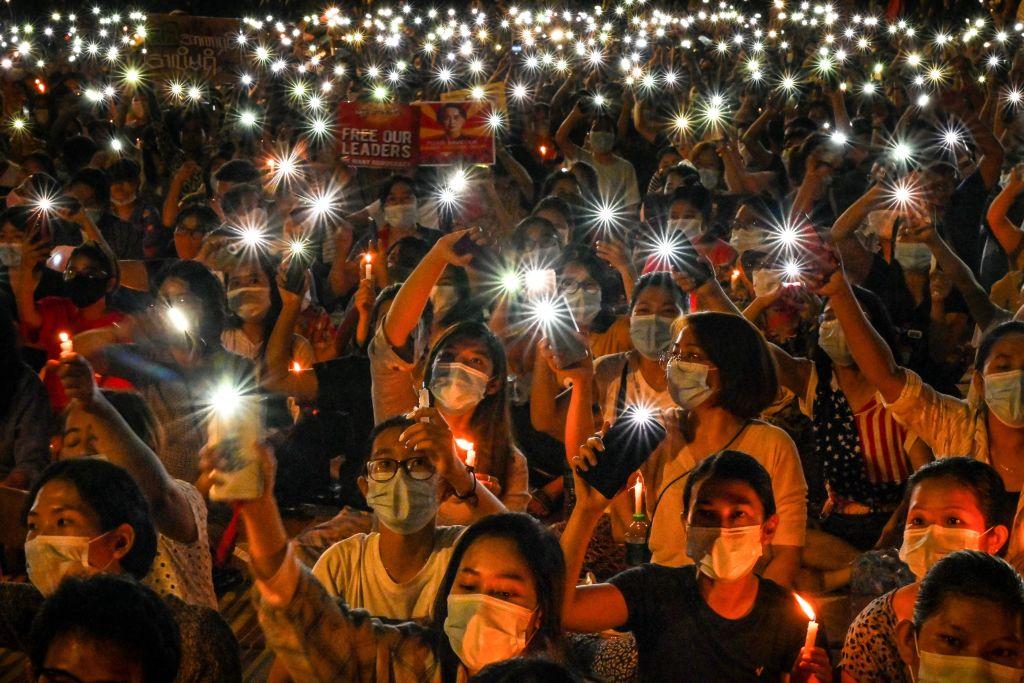
With ASEAN toeing the line of non-interference, the Quad has its first major opportunity to prove its mettle and help end the violence in Myanmar.
After a brief waltz with democracy, Myanmar once again descended into harsh military rule on 1 February. In the ensuing violence, the military, known as the Tatmadaw, has killed more than 1,100 Burmese, arrested thousands more and forced nearly 250,000 to flee the country. Increasing numbers of people are crossing the border between Myanmar and India to escape persecution, adding to the 980,000 Burmese Rohingya already seeking refuge in nearby countries.
ASEAN has long touted its centrality in the region, yet it has displayed a muted reaction to the violence in Myanmar. Despite moving towards a more cosmopolitan stance on humanitarian issues, the association remains mostly fangless against human rights violations by its members. ASEAN’s diplomacy on Myanmar has crawled along, limited to a goodwill dialogue with Tatmadaw leader Min Aung Hlaing, laggard action on humanitarian supplies, and the belated appointment of a special envoy to deal with the crisis more than three months in.
ASEAN’s principles of limited interference have severely undermined its effectiveness as a geopolitical tool. Meanwhile, the Burmese people are suffering at the hands of the junta. Beyond ending the bloodshed, immediate regional support is needed for Myanmar’s healthcare system to combat Covid-19, which threatens to cause outbreaks in bordering states. The Quad could fill that space.
The Quadrilateral Security Dialogue held its second leaders’ meeting on 24 September, in person in Washington, allaying any concerns that the grouping of Australia, India, Japan and the United States was dead on the vine. All four members are experiencing strained relations with Beijing and express a keen desire to parry China’s assertiveness in the region. The Quad espouses ‘a free, open rules-based order … anchored by democratic values, and unconstrained by coercion’.
Linked by these shared goals, the group ought to strive for a greater regional humanitarian role—after all, it was founded in part as a response to the 2004 Asian tsunami. This should start with Myanmar, and while the US and Australia have shown no qualms in denouncing February’s coup, each member has a role to play to help turn the tide.
India has strong ties to the junta, and in a strategy that befits his ‘Act East’ policy, Prime Minister Narendra Modi has walked a tightrope so as not to jeopardise India’s infrastructure projects in Myanmar. But by putting pressure on the junta—in collaboration with the other Quad members—to come to peace talks, while simultaneously providing greater protections and services to the displaced Burmese living in India’s Mizoram state, Modi must take a stronger stance. The trust that has already been built between the two countries increases the chance of cooperation between India and Myanmar’s regime.
Likewise, Japan is well positioned to influence the regime. Tokyo has kept communication lines open with both the government-in-exile and the junta, and helped broker a ceasefire. Japan is one of Myanmar’s top trading partners and also among its biggest aid donors. Tokyo needs to put aside its fear of losing diplomatic clout and take a front seat with New Delhi.
The Quad ought to harness India’s and Japan’s close ties to persuade the Tatmadaw to enter into peace talks with the ousted National Unity Government. While Aung San Suu Kyi’s administration was flawed, its powerful 2020 electoral victory represented a democratic mandate from the Burmese people to move their country forward, and while in exile, the unity government has begun recognising the Rohingya.
Fostering a transition to a democratically elected government would restore autonomy for the Burmese people. Australia could use its military and logistical know-how to spearhead a peacekeeping operation, as it did in Cambodia and East Timor. The Quad should also support the ‘three cuts’ policy, which aims to stop the funding, arming and granting of impunity to the Tatmadaw, starting with harsher sanctions to further isolate the entrenched military conglomerates Myanmar Economic Corporation and Myanmar Economic Holdings Ltd.
In line with its Covid-19 vaccine pledge, the Quad, particularly big vaccine producers America and India, need to work hand in hand to boost donations. If China can jump in to hand out medical supplies to the junta and resistance groups, then the Quad should double its commitment to prevent further catastrophe and position itself as the region’s foremost supplier.
By solidifying itself as a regional human rights mediator and facilitating a return to relative peace in Myanmar, the Quad would also edge closer to its purpose of counterbalancing China’s reach in Southeast Asia. The Quad is uniquely positioned to become a driving force for good in the Indo-Pacific, and its capacity to expand allows other nations to work alongside it. Myanmar ought to be the Quad’s first test, and its participation is sorely needed.